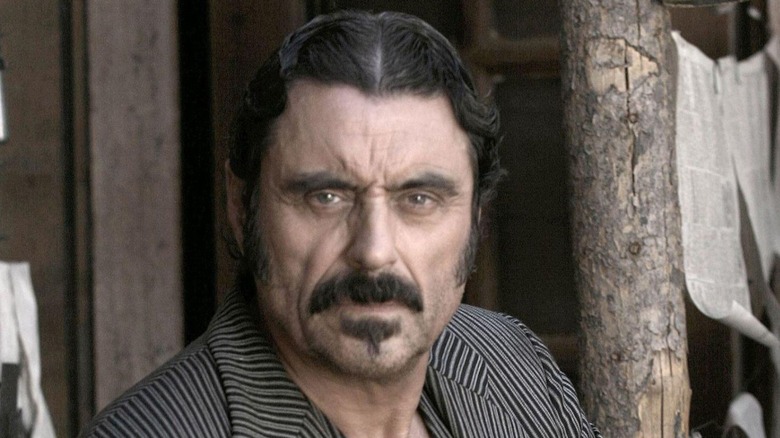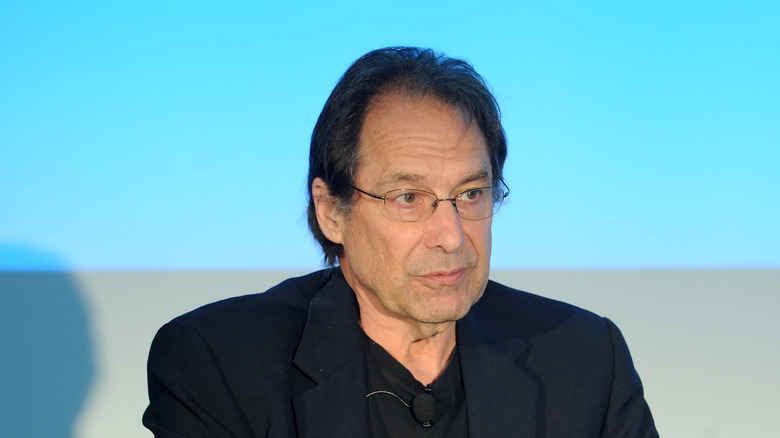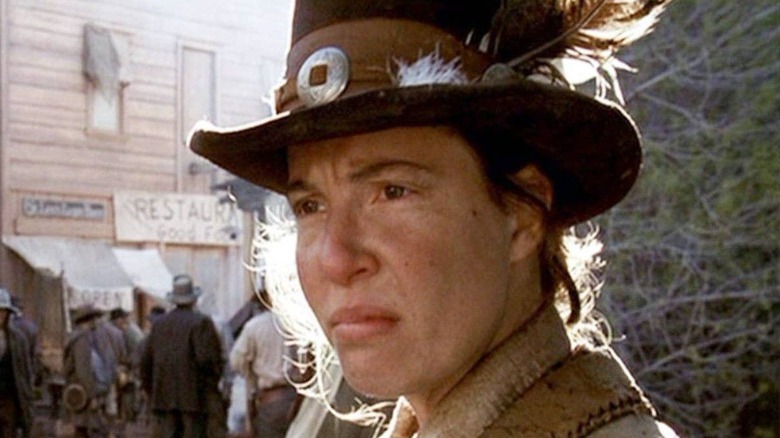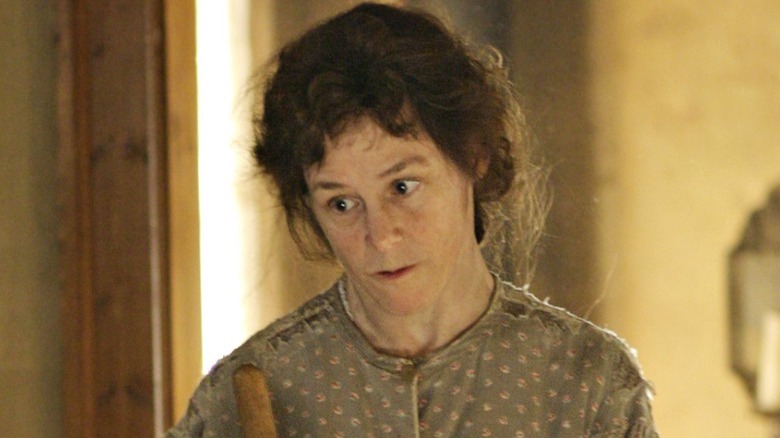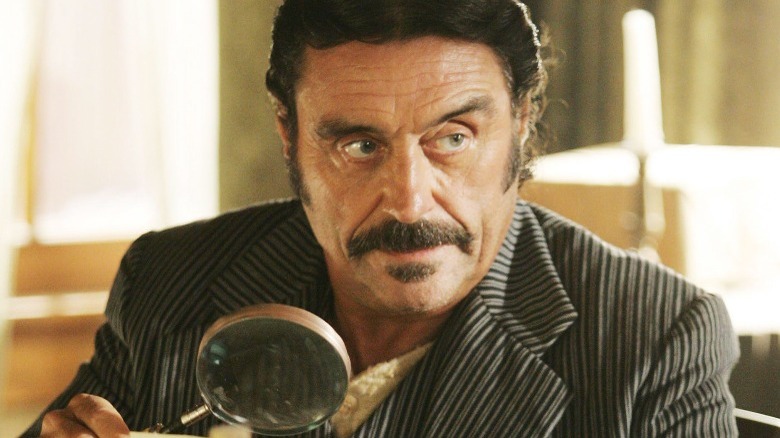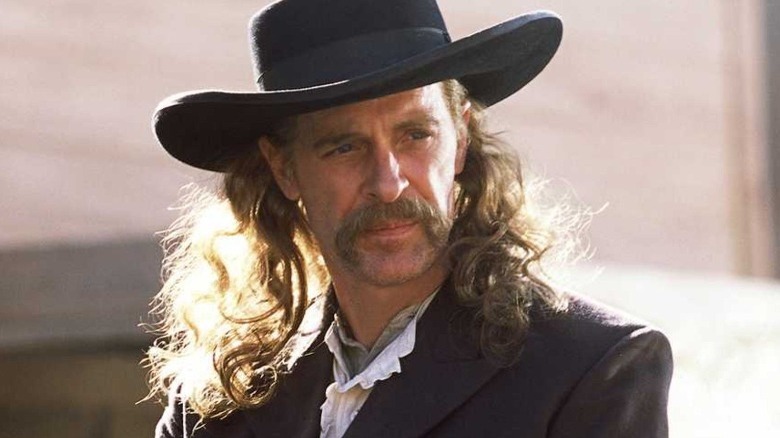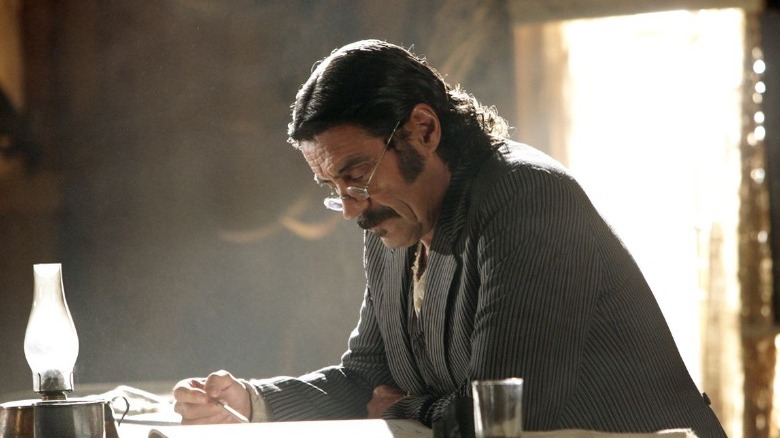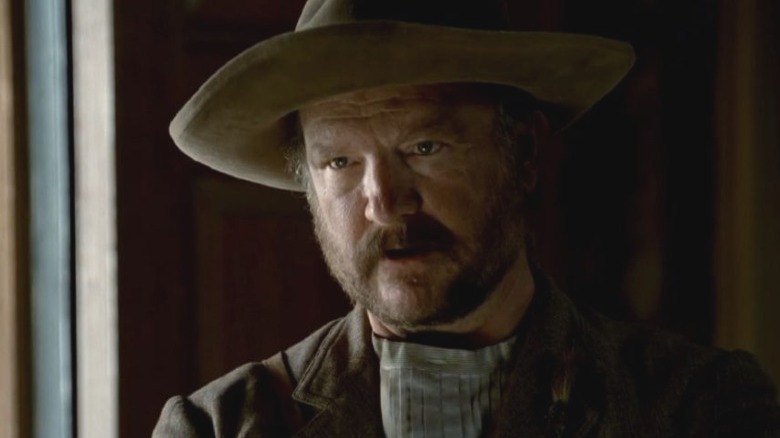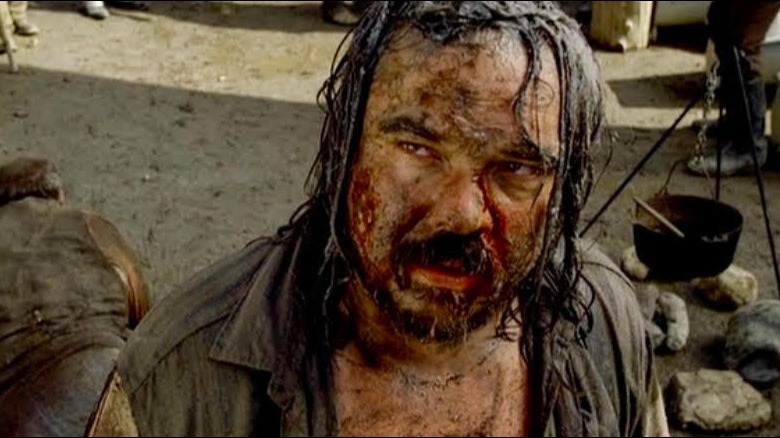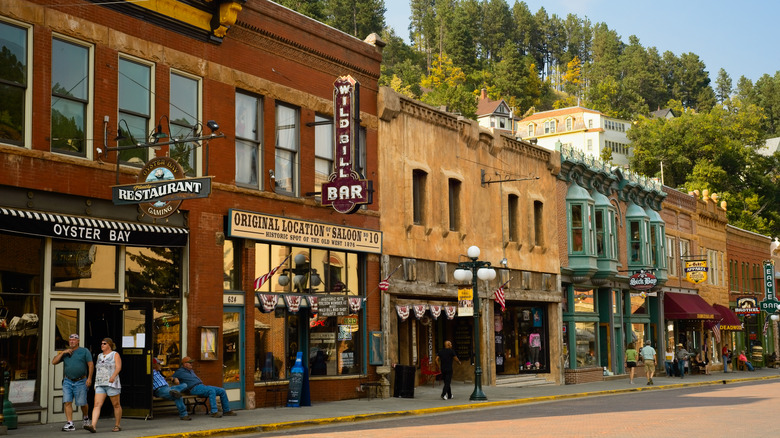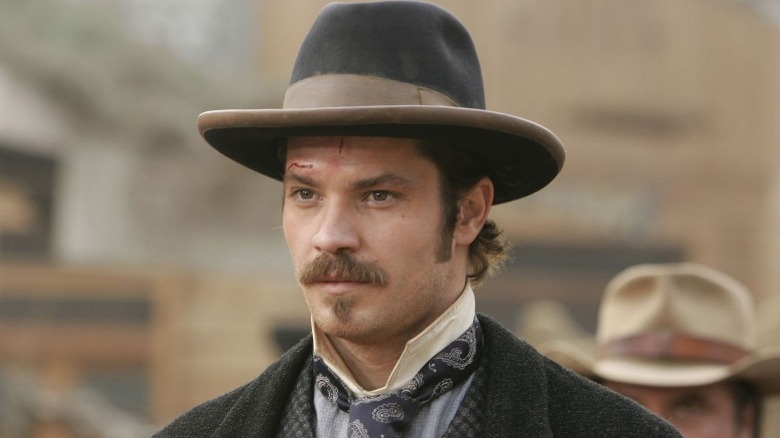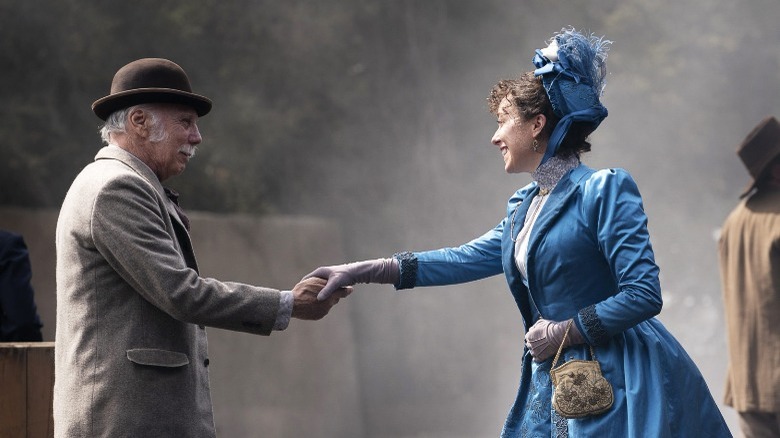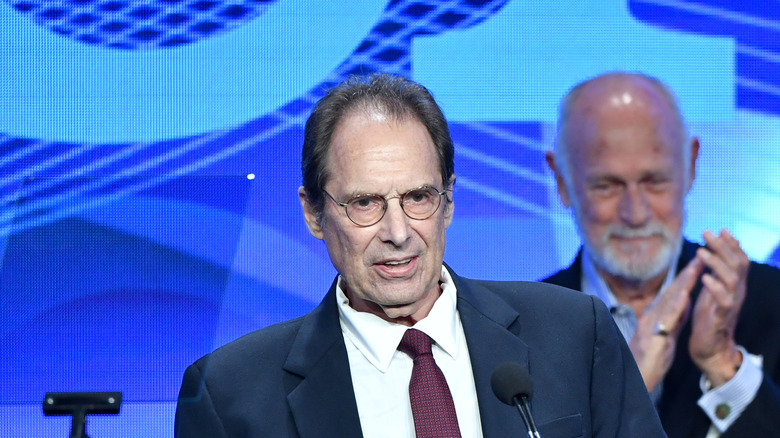The Untold Truth Of Deadwood
HBO's "Deadwood" is often ranked alongside shows like "The Sopranos" and "The Wire" that helped usher in the so-called "golden age of television." But its premature cancellation, for myriad reasons, sometimes put it in lower regard compared directly to the other legendary shows that had the time to reach a satisfying conclusion. The show got a wrap-up movie in 2019, reuniting the majority of the cast with series creator David Milch, at long last providing a two-hour coda to the story that began fifteen years earlier.
"Deadwood" was an impossible number of different shows at once: a revisionist Western that de-glamourized the myths of the frontier, an acting showcase rife with the kind of Shakespearian dialogue every actor dreams of, a compelling tearjerker, a ribald and uproarious comedy, and even a macroeconomic study of the way the belief in the value of gold caused a community to form around it. By circumstance, luck, and the will of its exacting architect and creator David Milch, it became one of the most legendary TV shows of our time, and a timeless American tale of any medium. And the abrupt cancellation and Hail-Mary wrap up movie providing closure are just the beginning of the tale behind the tale. This is the untold story of "Deadwood."
Creator David Milch originally set the show in Ancient Rome
The maestro behind "Deadwood" came to HBO with the idea well into a storied career. A published author and poet with a degree in writing from the prestigious Iowa writer's workshop, David Milch taught literature at Yale after graduating, where he was mentored by Pulitzer Prize winning author Robert Penn Warren. He began writing for "Hill Street Blues" in 1982, beginning a two-decade run of bringing his dense, literary style to crime and legal dramas. His most successful endeavor to this point was co-creating the show "NYPD Blue" with Steven Bochco.
By the early 2000s, he was ready to create a new show and use law enforcement as a window into the way a community is formed. But the original inspiration was not the time or place you'd think: his original vision of what became "Deadwood" was set much further in the past. "Well, this is going to sound kind of strange," he told American Heritage in 2006, "but my initial feeling was that I'd set it in ancient Rome, the time of the emperor Nero." Milch wanted to focus on Rome's relatively un-heralded "Urban Cohort," a sort of city police force that was left to deal with the day-to-day crime and chaos of the giant city with the Praetorian Guard soldiers were usually busy fighting in various emperors' clashes.
But as it happened, HBO already had the series "Rome" in production, which they felt covered too much of the same ground. So they asked Milch if he could explore the same themes of order forming from chaos, in a different historical setting. Milch realized that the city of Deadwood, which circa 1876 was as a lawless mining camp in Native American territory that would later become South Dakota, was exactly the setting he needed.
Did they really curse like that back then?
One of the most striking things about "Deadwood" is its unabashed vulgarity. Milch didn't specifically set out to dispel the genteel myths of American Western movies, but he presented a much different vision of the frontier than any TV show had ever attempted. After working in broadcast television for decades, he had full freedom on HBO to use as much violence, nudity, and — above all else — foul language to depict his vision of the West as accurately as possible.
The language, specifically, became the most talked-about aspect of "Deadwood" when it premiered, it was both shocking in its frequency and breadth of expression: the "f" word is used upwards of fifty times in the pilot alone. This caused most viewers to immediately wonder: did they really curse like that in the real Deadwood? Speaking with NPR, the curator of Deadwood's Adams museum Mary Kopco confirmed that essentially, they did: "The short answer is yes, Deadwood was a very profane place." While the Comstock Act of 1873 actually outlawed any publication of profanity for a while, making it difficult to study its use in history, there is ample evidence that all of the curse words used on "Deadwood" existed at the time the show is set. However, they probably weren't used as frequently or as vividly as we'd expect them to be today. Scholar and dictionary editor Jesse Sheidlower told New York Magazine "the evidence that we have is that they were using more religious blasphemy than the sexual insults which are popular today." But instead of using antiquated terms like "gol-darn" and "tarnation," Milch and co. went with language that would be as shocking to modern audiences as the citizenry intended.
The first character was cast in line at the pharmacy
If you're a fan of "Deadwood," you might think the first role cast was one of the more central, prominent characters on the show. Who will deliver the crudely eloquent monologues of Al Swearengen? Who will embody the simmering rage of Seth Bullock, or the anxious gentility of Alma Garrett? But a chance encounter in 2002 lead to a small role being the first official casting: Jewel, the sweet, disabled cleaning woman at the Gem Saloon.
As actress Geri Jewell told Yahoo! Entertainment, "I was at Horton & Converse drugstore in Santa Monica, standing in line. This man turned around, and he said, 'Oh, my God. Are you Geri Jewell?'" It was none other than future "Deadwood" creator David Milch, who recognized Jewell from as Cousin Geri on "The Facts of Life," a role which broke ground as the first recurring role for an actor with cerebral palsy. He promptly asked her "Want to be on a TV Western?" and after one more meeting, the first member of his sprawling ensemble was cast.
Ian McShane was the second choice for his pivotal role
Despite a main cast of well over a dozen, and hundreds of recurring guest stars, bit parts, and extras, no actor boosted their reputation more during the course of "Deadwood" than Ian McShane. As Al Swearengen, the owner/operator of the Gem Saloon, McShane was central to the labyrinthian plot of the show. But surprisingly, the role most associated with "Deadwood" wasn't originally written with McShane in mind.
David Milch wrote the role for Ed O'Neill, a best known as Al Bundy on "Married... with Children." According to O'Neill in an interview with Erik Hedegaard, David Milch was so certain he had carte blanch on casting decisions that he assured him "You're going to be my Swearengen ... It's done." Unfortunately, HBO hadn't been consulted at all on the decision at that point, so it was far from "done." O'Neill and Milch had worked together on the short-lived police drama "Big Apple," so he was convinced he had the dramatic chops necessary to overcome his reputation as a recognizable comedy star. HBO preferred to cast someone as relatively unknown as the rest of the cast, and suggested McShane. As Milch told C&I Magazine, "it's actually a testament to how wrong I can be sometimes ... the minute [McShane] walked in, he just took ownership of the role and my imagination."
HBO didn't want to kill off Wild Bill Hickok
The most recognizable "Deadwood" cast member is almost certainly Keith Carradine. Known for movies like "McCabe & Mrs. Miller" and "The Long Riders," as well as dozens of other Western roles, he was so well-prepared to play Wild Bill Hickok in "Deadwood" that he brought his own wig. A decade earlier one had been custom made for him to play Wild Bill's contemporary gunslinger Buffalo Bill Cody in Walter Hill's "Wild Bill." Speaking with The AV Club, Carradine says he received a call from Walter Hill, now set to direct the pilot of "Deadwood," who asked him what his hair looked like."I said, 'Well, it's short, Walter, but ... I've still got that wig!'"
Reception of his performance was so positive that HBO initially pushed back on the character's planned death in the fourth episode of the show, matching the timeline of the real Wild Bill's infamous shooting during a hand of poker. Carradine recalled his discussion with David Milch at the time to Yahoo! Entertainment: "[Milch] said 'the good news is they love the show ... the bad news is they don't want me to kill Hickok." Despite the network's note getting his hopes up for a longer run, David Carradine made peace with a brief run on "Deadwood" as Milch won the battle and stuck to the original plan. The character's presence, aided by Carradine's pitch-perfect performance, reverberated throughout the rest of the show's run.
David Milch was constantly rewriting new dialogue on set
Lauded for its dialogue, plotting, and depth, the success of "Deadwood" begins and ends with the writing. And while there was a large team of writers on the show, nearly every script was heavily re-written by showrunner David Milch, to better fit the rhythm of the language he heard in his mind — sometimes on the spot. "Truth be told, David rewrote us all" cast member W. Earl Brown told Yahoo! Entertainment.
It wasn't just the writers that had to swallow their pride — actors had adjust to the demanding task of learning several new pages of dialogue on the spot. Actor Brad Dourif, who played fan-favorite Doc Cochran, recalled a particularly infuriating incident: "One time he came up to me, and said, 'You see this line?' And he gave me four pages. 'I'm replacing this line with this,' and it was a four-page monologue."
Deadwood was the original no one is safe show
Well before "Game of Thrones" gained notoriety for killing off main characters, "Deadwood" — by the virtue of its setting and commitment to authenticity — was the best example of a show willing to kill off major characters without warning. It was simply a reality of the West, and the particular power struggles that came with being a lawless, frontier mining camp. Viewers unfamiliar with history were likely shocked when Keith Carradine's Wild Bill Hickok, one of the biggest presences in the world of the show, was shot and killed in just the fourth episode of Season 1. Plenty of characters would succumb to illness, stabbings, gunfights and more over the course of three years and a movie.
Speaking with Inside Pulse during the filming of Season 2, Jim Beaver laid bare the anxiety that he felt over the potential fate of his character, pure-hearted prospector Ellsworth: "Everybody on 'Deadwood' is worried they're going to end up pig chow. Well, maybe not everybody, but I think the worriers outnumber the non-worriers!" Ellsworth was killed by an assassin at the end of Season 3.
The guitarist of Alice in Chains inspired the show's grossest moment
One of the most memorable moments in all of "Deadwood" is the Season 3 fight between Dan Dority (W. Earl Brown), one of the (relatively) good guys, and Captain Turner (Alan Graf, also the show's stunt coordinator), a villainous henchman. Showrunner David Milch wanted the fight to be completely realistic and avoid Western clichés, or as W. Earl Brown recounted to Slashfilm: "No cowboys flying through plate glass."
So the actors and crew found themselves coordinating a bare-hand, all-out brawl in the mud of the thoroughfare with no clue how to end it. Fate intervened at a poker game Brown was playing with a friend: Alice in Chains guitarist Jerry Cantrell. Apparently, his brother Dave Cantrell had once been badly losing a bar fight, when "in desperation, he tried to push the guy off of him. He felt his finger hit soft tissue and knew without seeing it, that it was an eyeball." And so the makers of "Deadwood" found their way to have Dority, seemingly about to lose his life, turn the tables and win the fight by clawing out Turner's eye in a stroke of luck, and by far the most intense visual of the show was born.
Deadwood the show lead to tourism for Deadwood the town
Beyond well-known Old West heroes like Wild Bill and Calamity Jane, many characters in "Deadwood" were based on real citizens of the historical city of Deadwood in present-day South Dakota. Central characters like Al Swearengen, Sol Starr, and Seth Bullock were based on real people, although many characters had slightly different fates than their real-life counterparts. As Newsweek reported, the legacy of the show has driven tourism to the real town to the degree that there are many specific travel packages designed around the show and movie like the "Deadwood: Heroes & Villains" tour.
You can even get a guided walking tour from the town's first Marshall — which is to say a re-enactor playing the part of Con Stapleton, who was also a character in "Deadwood." While they welcome visitors, the city's official website does have an entire section of its website about differences between the HBO show and real life.
Most actors still hold their time on Deadwood in high regard
"Deadwood" is famous for boosting the careers of the dozens of actors that took part, who have collectively appeared in thousands of different TV shows and films. But in interviews, time and time again, they recall their time on "Deadwood" as a head above all the rest. Speaking with the AV Club, W. Earl Brown recalled something a fellow actor once told him: "He said 'I don't really care about money, fame, and that stuff. What I want to do is something that has an impact...' And 'Deadwood' was that for me ... I think it was, for everyone involved, something really, really special."
Keith Carradine remarked to the AV Club as well that it wasn't just the role of Wild Bill Hickok that attracted him to the part, but the mad genius behind "Deadwood" that made it more memorable: "I mean, what a role to have the chance to play, but especially as written by Milch. It was extraordinary stuff. He wrote this kind of American Shakespeare." Robin Weigert, reflecting on returning to her part as Calamity Jane for "Deadwood: The Movie" with Slashfilm, echoed the sentiment on the writing, as well as the cast: "So we were getting incredible words to say. And I knew that I was with an exceptional cast -– that everybody I got to partner with in scenes was humbling, wonderful."
Everyone gave up hope of a wrap-up movie
After a slow-motion death in 2006 — when HBO and David Milch debatedabout production schedules, costs, and the length of a potential Season 4 for so long that the casts' contracts expired — there were rumors of everyone reuniting for one or possibly two wrap-up movies. But each time the plans didn't come to fruition, it sank the sprawling casts spirits further until it seemed all hope was lost. Asked by Vulture if he ever thought the movie would really happen, the famously verbose Ian McShane replied with a curt "No."
Even W. Earl Brown, who for years maintained a hand-written list of every main cast members' current commitments for several years just in case, lost the faith at some point. "I gave up beating the dead horse after a few years," he told Slashfilm in 2019. Finally, on the strength of the show's strong DVD sales and streaming legacy, Milch and HBO struck a deal for the movie. At the very least, every member of the cast can give interviews moving forward without being asked if they've heard anything about it.
David Milch finished the Deadwood movie while battling Alzheimer's
In 2015, David Milch received a diagnosis of Alzheimer's. Just months later, he finally reached an agreement with HBO to write a script for "Deadwood: The Movie" and began a four year process of wrapping up the story. His usual mad rush of re-assembling sets and scenes on a whim and last-minute rewrites were tempered by the symptoms of the disease. He relied more on the director and other producers to run things on set, and stuck to the script. But that script was still pure Milch magic, and writing has proved to be Milch's best weapon to hold on to his mind in the face of the disease's progression.
Speaking with Vulture, his wife Rita described it with an analogy perfect for the legendary TV creator, who wrote an ensemble casts' voices like a symphony conductor: "I compare it to a musician who can still play and has access to the memory of how to do that and is still able to exercise his talent ... The brain is David's most exercised muscle."
